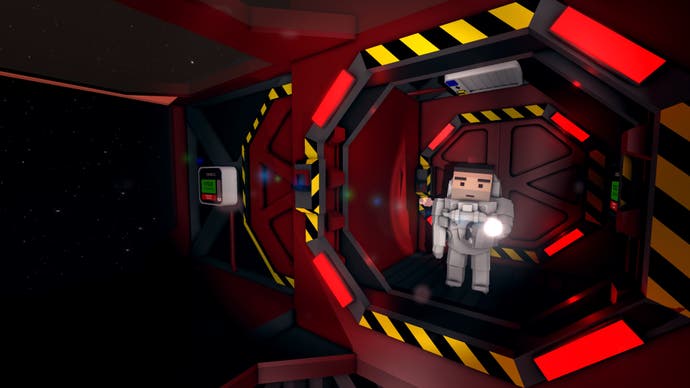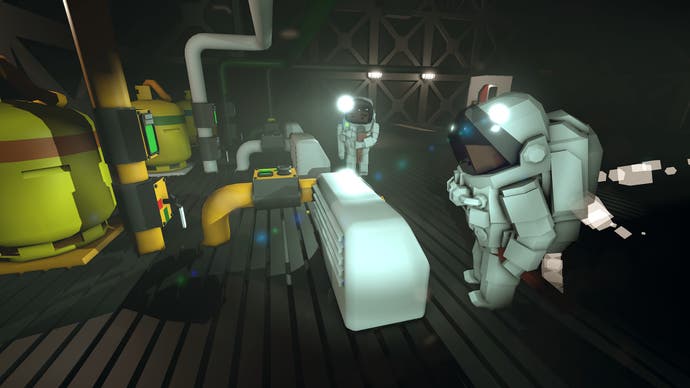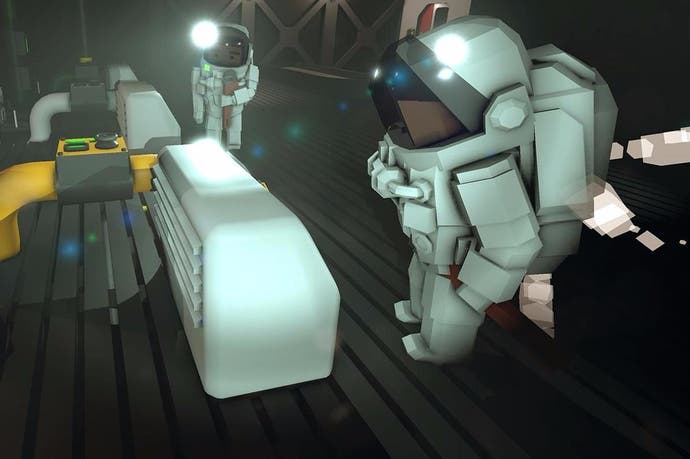Dean Hall's Stationeers is all about airlocks, lung transplants and stress
But is it a game yet?
I move a cartoony astronaut around a space station, floating outside, walking inside. I press digital panels to open doors and pressurise chambers. I fiddle with valves and control panels to alter mixtures of gasses, put a rock on a conveyer belt leading to a furnace and turn it into an iron bar. I burn hydrogen in a 'burn room' at ridiculous temperatures to make water. I even wave at the one or two other astronauts I see around. But I don't feel like I'm playing a game.
I feel like I'm touring someone else's creation, like I would in Minecraft, except in Minecraft I know what I'm looking at, know how it was made. Here, it's lost on me. I don't see a castle or a palace just a basic, bland space station.

This is Stationeers, the new game from Dean Hall's studio RocketWerkz, a small project with a hardcore niche in mind. It's in very early shape at EGX Rezzed and is still "a matter of months" away from an Early Access release. A lot of the bigger picture cannot be seen yet. But as Dean Hall explains it to me I start to see.
The big idea in Stationeers is to build a base with friends - or alone - over the course of weeks and months, then explore the galaxy from it. Your game worlds are like realms in Minecraft, quick to start and for you and a small amount of friends (currently 16 max). One day worlds may be linked but this is not a massively multiplayer game.
Persistence and building are the most important distinction between Stationeers and the legendary Space Station 13, a game Dean Hall is a big fan of and openly inspired by. Space Station 13 is a top-down, round-based, multiplayer game where people take on a multitude of roles aboard a space station and try to keep it running. It's an enormous, community-powered-and-evolved project that has proven hard to imitate. But players don't really build things in Space Station 13, and gameplay happens round to round - not over a course of days, weeks and months. These are the areas Stationeers is specifically interested in.
You begin on a planet, or in deep space, and naturally with very little, so you'll order vital components in. But over time, through mining and refining and crafting and farming, you will become self-sufficient, and gradually more complex technology will open to you. Eventually you will attempt to design and build a shuttle, and when you succeed, unlock Away Missions and fly off on adventures to repair, rescue, battle aliens and more.

Getting there won't, however, be easy. Unlike in Minecraft, where one built thing tends to represent one block, in Stationeers one thing can have many layers. Take a light switch for example: it first needs a casing, then a circuit board, then a screen, and then a disk inserted to program it to behave like a light switch. Then it needs wiring up to a switch. Walls, to give another example, consist of metal sheets welded to a frame underneath.
Being in space makes this all more complicated still. Rooms may need pressurising, if you want to walk around them without a spacesuit on, which means mixing and piping gasses into the area, and making sure they are properly sealed to avoid explosive decompression. That means pressurisation chambers, which involve multiple doors and processes linked together by you. All of a sudden, the space station I'm touring doesn't seem so basic, and the idea of building, pressurising and even fuelling a shuttle seems positively daunting.
Then there's survival, and Dean Hall loves survival. Lungs and brains are things in Stationeers - objects inside of you. They can be damaged by pressure and by suffocation, but can also be fixed by surgery, even enhanced genetically and transplanted. There's hygiene that leads to disease if you ignore showering, there's even insanity if you are outside for too long - reducing it means going inside to the bar. That's on top eating and drinking, all in a place that doesn't naturally provide water, food or air. Do you know the scientific composition of air? You soon will do.
Other players can kill you too, although Stationeers is not, repeat not, designed as a PvP game. Should you die, you can either restart afresh or you can be carried to a cloning station and cloned, a real timesaver when character skill-trees come in.
One day players could be running prison colonies or tourist destinations or hospital stations. Or perhaps they may specialise in producing fizzy drinks and selling them to other players. The visions are exciting but so far they are only visions - so little of it is in game. What guarantee do we have this vision of Dean Hall's will come true?
Because of what has come before with DayZ and more recently cancelled space game Ion, Hall is being very careful. Everything outlined above - and in the embedded video - belongs to the game's public roadmap. There are other ideas but they are secret. And everything on the public roadmap will, Hall says, be finished if Stationeers sells 20,000 copies. For someone of Hall's visibility, that's peanuts.
"We don't know how many people want to play this game," Hall tells me. "We scoped for only selling 20,000 copies which we think we should be able to do in Early Access no problem, and if it does that many, we'll finish our roadmap and be very happy with it. If it does more then we can look at more advanced stuff - but we'll keep that to ourselves."
The plan is for Stationeers to cost around $20 and be in Early Access for 12 months, and I will be very surprised if Hall deviates from that - he is treading so carefully. Still, we will have to take his word for it.
Stationeers' cute and simple look belies the deep, sciencey systems underneath. If defying the hostility of space to build a home over weeks and months is your thing, there will be plenty here for you, but it won't be for everyone. Nevertheless Stationeers will have to do a lot more than it currently is to coax people away from the space-base games already out there. The charismatic Astroneer, for example, makes Stationeers look like a sterile tech demo.
Then there is the foreboding matter of the so-called "curse" of Space Station 13, which seems to poison any game that tries to emulate it. Hall tells me Ion fell victim to it. But this time, with Stationeers, Hall believes he has cracked it. "I think I've figured out what the Space Station curse is," he says. "We think we've solved it with this game." Whether he has, we will have to wait and see.


